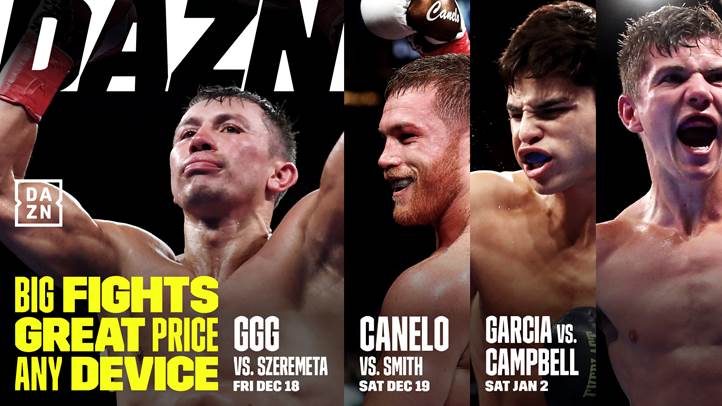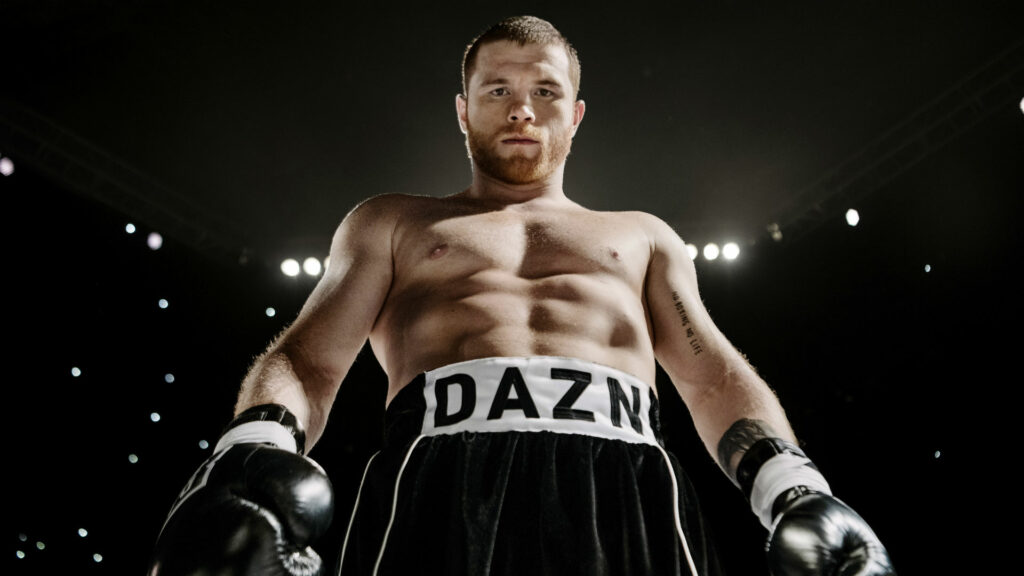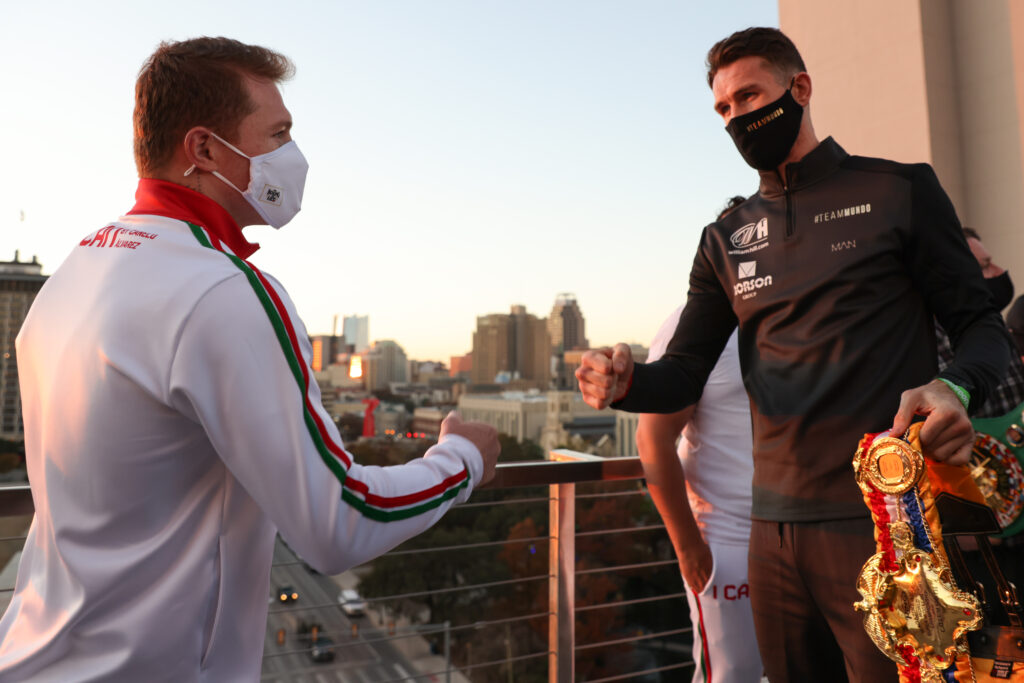Sports streaming giant DAZN have come out fighting with a packed end of year boxing slate. Joe Markowski, the company’s EVP, talks in-depth to Boxing Social about the challenges of working in boxing, the prospects for Joshua vs Fury, working with Ryan Garcia and Canelo Alvarez and much more…
Prize fighting has always been a messy business.
From the days when men met and stripped to the waist on county lines, dodging magistrates to do battle, to bloody modern-day showdowns in glittering temples of Mammon in Las Vegas, pugilism has consistently but uncomfortably fused sporting spectacle with financial wrangling, with a side helping of internecine conflict for good measure.
It’s a challenging context that Joe Markowski – the EVP of upstart streaming giants DAZN – is all too aware of.
But it’s a challenge he – and DAZN – are meeting head on.
“Boxing is not like other sports,” he admits with a smile via a Zoom call during which his honesty and candour prove both refreshing and illuminating.
“When you buy the Premier League rights or the Bundesliga rights for any market in the world, you get an email with a nice tidy PDF that says:’ the season starts on this date, Liverpool play Man United on this day, Dortmund play Bayern Munich on this day,’ and you build your marketing around that.
“In boxing you have to make the events happen and you have to work with a large number of stakeholders. But when it works, and you can get a sequence of events that are appealing, you can make a lot of noise and you can attract a lot of subscribers and keep them. That’s what’s attractive to us about boxing.”
When Markowski and I speak, he is still basking in the excitement engendered by Anthony Joshua’s nine-round victory against Kubrat Pulev – a fight which is one of the centrepieces of an impressive few weeks for DAZN in the wake of a global launch that has seen them enter around 200 new territories worldwide.
“Our boxing programme hasn’t just survived Covid, it has thrived in Covid,” Markowski declares emphatically. “That’s why we are ending the year on the front foot.”

This weekend DAZN features Gennady ‘GGG’ Golovkin versus Kamil Szeremeta and Saul ‘Canelo’ Alvarez versus Callum Smith, while Luke Campbell squares off against Ryan Garcia on January 2.
For now though, it is Joshua who occupies our discussion. Although AJ’s fights are currently televised by Sky Sports and not DAZN in the UK, Markowski is clear that the heavyweight champion’s global appeal makes him a vital part of DAZN’s marketing armoury moving forward.
“I think that Anthony Joshua’s global superstardom is only just getting going,” he says. “You couldn’t get a more marketable athlete. He’s got knockout power, Greek God physique, he’s well spoken. I spoke to my grandmother today and she’s as invested in Antony Joshua as any of my friends in my age category. He transcends generations and demographics and is a national hero in the UK. You couldn’t build a more perfect heavyweight champion than Anthony Joshua.
“With the right promotion, which he obviously has, with the right fights on a global scale – two of which we will hopefully get with Tyson Fury next year, his star is only going to ascend.”
Markowski is confident that the much-mooted showdown between Joshua and rival champion Tyson Fury can be brokered, despite the complications of competing broadcast contracts – in the USA Fury is tied to ESPN and Joshua to DAZN, while in the UK Joshua is with Sky and Fury with BT Sport.
“You’ve got four broadcasters at the core of the conversation. We want to get around the table and make the fights happen. There are inherent complications but I can see paths through.
“At DAZN, we are creatively minded and have a flexible way of doing business. If you ask anyone in the sports industry they will tell you we are good partners who are flexible and pragmatic and commercially nimble. That will continue into these AJ and Fury negotiations.
“The core deal with the promoters is pretty clear – it’s a 50-50 [purse] split. I think everyone’s on record as saying that. How and where it’s broadcast in the core markets of the UK and the US is now the conversation. Everyone’s motivated. I’m pretty sure everyone’s flexible.
“I don’t see any barriers to it happening. Now AJ has got through Pulev the conversations can start. The devil will be in the detail, but we have the rights teams and legal teams to deal with that and we’re going to approach it pragmatically, flexibly and nimbly and we will make a deal happen. I expect to see two AJ-Fury fights in 2021.”
The other big star in the DAZN firmament, of course, is Saul ‘Canelo’ Alvarez, who signed a $365m, five-year, 11-fight deal with the company in October 2018. However, after several weeks of speculation, the Mexican was released from that contract in November with eight fights still remaining.

but a strong relationship remains, says Markowski
Nevertheless, Canelo is back on DAZN this weekend and Markowski is bullish about the prospects of the relationship continuing beyond the Callum Smith fight.
“Our relationship with Canelo has always been good,” he explains. “This will be our fourth Canelo fight. When you think of the weight classes and the challenges he’s bounced through it’s remarkable. He’s clearly – in my opinion – the pound for pound king of the sport. He is willing to test himself.
“He’s a fantastic commercial draw, especially in the US but outside of it, too. He and we have always had a good relationship. Clearly, there have been challenges presented this year, largely due to the changing commercial landscape due to Covid. We got to the point in late summer, early autumn where the three parties [involved with Canelo] – ourselves, Golden Boy and Canelo amicably came to an agreement to part ways. Always from our perspective there was the prospect of a future working relationship and that happens to have immediately presented itself which is great.”
Canelo-Smith fight is being promoted by UK promoter Eddie Hearn whose association with DAZN, Markowski argues, has helped build the company’s visibility and credibility.
“UK consumers in particular have become aware of DAZN through the noise machine that is Eddie Hearn,” he smiles. “I don’t think he’ll mind me saying that. He’ll take it as a compliment!”
The Canelo-Smith fight provides Hearn with an opportunity to impress Canelo and potentially work with him again in the future.
“It’s a great audition for Eddie from a promotional perspective,” Markowski agrees. “Eddie is not everyone’s cup of tea and he winds some people up, but he’s a fantastic promoter and he’s got the opportunity now to work with the biggest name in US boxing as well as the other guys he promotes.
“We’re delighted with him [Hearn] and we’re very confident going into our weekend in the US of GGG and Canelo-Smith of the numbers we can do in the US. We think there’s a pent up demand for a Canelo fight in the US because he hasn’t fought in more than a year now.
“He’s a cultural draw for Mexican-Americans and the Hispanic community more broadly. We’re happy to be in business with Canelo in the longer term and assuming all goes well this weekend and if Eddie does as good a job as he and Frank [Smith] and the team are doing, then we’ll sit down and talk about what the future holds.”

Photo: Ed Mulholland/Matchroom Boxing.
Releasing Canelo from his current deal was one part of a wider restructuring process that DAZN have undergone since the beginning of the Covid-19 pandemic.
“A lot has happened these last few months – both outside the four walls of DAZN, as well as in the industry and behind the scenes at DAZN,” Markowski admits. “I see it in three phases really. Like most businesses around the world we were hit by a completely unforeseen dramatic, seismic shock which hit our business. The months from mid-March to mid to late May we were dealing with the reaction to that.
“Obviously, boxing is a big part of what we do, but it’s not everything we do. But boxing was tied inherently to our strategically relevant projects like our [originally planned] May launch. And it still is with our end of the year rescheduled launch.
“We had two months addressing that dramatic change. Then in the summer we went through what I would describe as a strategic reflection period. I think we needed that as a business and I don’t think our management team would mind me saying that.
“We’ve grown at such a pace – we’re less than five years old – and we’ve been planting flags all over the world. When you’re moving that fast there’s not much time as a business to reflect and ponder.
“I think we used the time in June, July and August really well and by the end of the summer we’d restructured, we’d made some tough decisions about personnel, which is never nice, and we had reflected on our strategy and made a plan of action that was ready to move into effect.
“The last two months has been our execution period. During these three phases of reaction, reflection and execution, I think we’ve pulled together very well. We’ve used our time efficiently, we’ve scaled back on certain projects. we’ve reset relationships.
“To be a sports business that is making subtly quite an aggressive statement at the end of the year by accelerating and going global I think is quite remarkable given the year we’ve had and reflects the significant work we’ve done over the last seven or eight months.
“I think we’ve repositioned our business in healthy way and I think in the longer term I’m now even more confident about where we are and where we’re going.”
DAZN’s innovative pricing strategy – with its £1.99 per month introductory offer – provides a huge incentive for fans to subscribe.
As Markowski describes it, it is also a deliberate attempt to recalibrate and challenge a market that he believes has – for too long – not provided value to sports fans.
“We believe that in the long-term the boxing market needs to correct itself in pricing in order to engage a large audience,” he argues. “The reason boxing has struggled to compete with other sports, notably the UFC, in the last 10 or 15 years or so, is that it’s priced itself out of the market.
“I’m sure you and your readers have complained about £24.99 pay per views in the UK. But bear in mind that’s a third of the price of a top US PPV. And that’s ignoring the 200 bucks or so American fans pay for the equivalent of a Sky or BT type package.
“Boxing has – excuse my French – taken the piss in terms of how much it was charging fans. Having Mayweather or Mike Tyson fights as pay-per-view is the equivalent of the SuperBowl or the FA Cup final or the Champions League final being put behind an 80 or 90 dollar paywall. No other sport does that and our strategy in the US directly counters that.”

Photo: Mark Robinson/Matchroom Boxing.
Markowski believes that the exploitation of the pay-per-view model is one reason why ‘novelty contests’ such as KSI versus Logan Paul and Mike Tyson versus Roy Jones have racked up sales figures which dwarf those of recent contests involving modern boxing stars such as Errol Spence.
“Being completely candid, should they be as important to a boxing broadcaster like us as they are? No. But it’s the reality of where the sport is at right now.
“If you could generate a bigger audience with a match between the Manchester United 1999 treble winning team and the equivalent team from Bayern Munich, than you could for a match between today’s Bayern Munich and Man United teams then the soccer broadcaster would broadcast it. But you can’t. The world has moved on and the fans want to watch – in high numbers – today’s Man United team against today’s Bayern Munich team.
“And that’s because football is better organised than boxing. Boxing’s politics and its bullshit and its egos and dis-organisation causes it to present a lesser version of itself than it should. So broadcasters such as ourselves who want to make our business in boxing need to seek out ways to generate the audiences who are interested in boxing.
“If you put Tyson and Jones in the same bucket as KSI and Logan Paul – broadly novelty events, then we’re all for that. Events like that are great and good for boxing. They are commercially viable, they make a lot of noise and bring eyeballs to boxing that wouldn’t otherwise come to boxing.
“If there were twice a month, 24 times a year premium boxing match-ups where fighter A who should fight fighter B always immediately fought that person, like in the UFC, you wouldn’t have this level of consumer apathy that you have for boxing among casual fans.
“Some of my promotional partners might get pissed off with me saying this, but it’s just a fact. Boxing needs to organise itself better and get itself in a place where when the consumer demand is there for a fight it makes the fight happen.
“It’s very challenging and I say this as someone who is involved in making the fights. There are so many considerations – promoters, governing bodies, mandatories, exclusivity arrangements, loads of other factors. But boxing doesn’t do itself any favours.
“Our message has always been: we want big fights to happen and we’re doing that on behalf of boxing fans and sports fans. When you see a really well-timed fight happen when it should happen between two guys who have a narrative and there’s a reason for the fight that can be explained by the promoter to the public, you get casual fans interested.
“My dad is not a hardcore boxing fan. Would he watch AJ-Fury? 100 per cent and so would his friends at the golf club. When boxing cuts through it cuts through, but it doesn’t cut through as often as it should. We will continue to use our leverage with promoters and our investment in the sport to enforce and insist that the fights that should happen do happen.”
With this in mind, Markowski believes the pandemic could have a positive effect on boxing in one respect.
“One thing with Covid is that an element of the bullshit has been flushed out of boxing. People are realising they need to stop dancing about and make the big fights happen. Because consumers aren’t prepared to tolerate anything else. Not to put too blunt a point on it, these novelty fights we’ve talked about wouldn’t be as big as they are if boxing got itself properly organised.”
Markowski’s honesty is admirable, as is his optimism. Although unafraid to speak some home truths about the sport, it is also clear he believes that boxing and DAZN are moving in the right direction.
He also argues that – in 22-year-old lightweight Ryan Garcia – the company possesses an asset whose crossover and commercial potential are vast.
Garcia recently came twelfth in Nielsen’s influential and annual top 50 chart of the most ‘marketable’ athletes in the world, and Markowski is an admirer of ‘Kingry’s social media acumen and pugilistic prowess.
“I recently saw a great Instagram post that I think Ryan or Golden Boy had reposted,” he says, by way of example. “A middle-aged dad who is a massive boxing fan in Texas, a Mexican-American guy, had screenshotted a conversation with his daughter who is 12.
“His daughter had said to him: ‘Ryan’s fighting in Dallas on January 2. Can we go?’ The dad’s reaction was: ‘How did you know about this?’ Her reply was along the lines of: ‘Come on, dad, I follow Ryan on Instagram he’s gorgeous.’

Photo: DAZN.
“That’s a nice microcosm of Ryan’s stardom and potential. He is in a unique position where he is a superbly talented boxer with power and – especially in his last four or five fights – a fantastic highlight reel.
“He’s well promoted, a fantastic self-promoter. He ticks the good-looking young bloke box several times over, he’s well-spoken, he’s leveraged his position to be able to transcend boxing fans and sports fans and is a celebrity in his own right in the Youtube-er world.
“He has a dual mindset of boxing as his core business but he’s also a content creator, a model and a brand. But what I think is most impressive about him is he’s not been distracted by that. He is training with Canelo in one of the best if not the best training camps in the world for technical boxing expertise. He’s very committed and hasn’t been distracted.
“He’s an impressive all-round guy and he has an opportunity to really accelerate his career in 2021 if he can get past Luke Campbell and that’s no easy task. But if he does the Devin Haney fight lines up in early spring or summer, that’s a very clear brief we have with Golden Boy and Matchroom that that fight needs to get done if he gets by Campbell.
“We’re very, very happy to be a partner of Ryan Garcia because we think all around the park he’s a superstar.”
Has the traditional boxing world been sleeping somewhat on Garcia I wonder?
Markowski concurs. “I think there’s a bit of a weakness in the boxing world, not with the fans at all, but in the industry, that means Ryan has been dismissed as a pretty boy or that guy that’s mates with Logan Paul so he must be a joke.
“No, he’s a marketeer. He knows what he’s doing, this is the new age of promotion. It was pay per view, it’s now social media. That’s how you build an audience, that’s how you transcend the sport and transcend sports fans more generally. If 100,000 teenage girls in the US watch Ryan Garcia vs Luke Campbell on January 2 that’s great for the sport of boxing.
“If they’re only watching it because they’re enamoured with Ryan Garcia who cares? It’s an entry point to the sport and if they follow his career then they’ll consume more boxing.”
It’s an analysis that aptly summarises Markowski and DAZN’s vision for boxing’s future.
Forward thinking and innovative, after so many false dawns for a sport that is often its own worst enemy, perhaps the brave new world really is upon us.
Main image: John Walton/PA Archive/PA Images.
